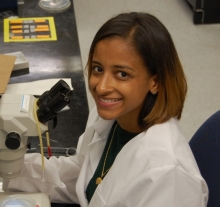
Major:
Mentor(s):
Faculty Sponsor(s):
Faculty Sponsor's Department(s):
Project Title:
Project Description:
The free- living non-parasitic nematode Caernorhabditis Elegans (C. elegans), is ideal for use as a model organism of human development and disease due to their short generation time, transparency, small size, fully sequenced genome, and large conservation of homologous human genes. While its genome is fully sequenced, the function of individual genes is still under investigation. This work seeks to determine which of C. elegans’ genes are involved in chemotaxis, the ability of an organism to form a physical movement in response to a chemical stimulus. Using RNA interference (RNAi), we tested the five highest scoring candidate genes, ODR-10, KQT-3, F47B10.8, L4440, and ADD-1, identified to affect chemotaxis during a large scale unbiased screening conducted in undergraduate biology teaching laboratories. Following RNAi treatment, a chemotaxis assay enabled observation of the worms’ response to odorant molecules to determine if loss of gene function affected the ability to sense chemicals. Microscopic examination of neuronal morphology determined if a defect in ciliary structure, rather than inter- cellular or intra-cellular communication resulted in abnormal chemotaxis. Data concluded the gene ADD-1 showed importance to chemotaxis while data for the other genes, F47B10.8, L4440, KQT-3, and ODR-10, was inconclusive and will be further investigated during a repeat of the experiment. Obtaining a better understanding of the genes involved in chemotaxis in C. elegans is important for further studies in human disease.
